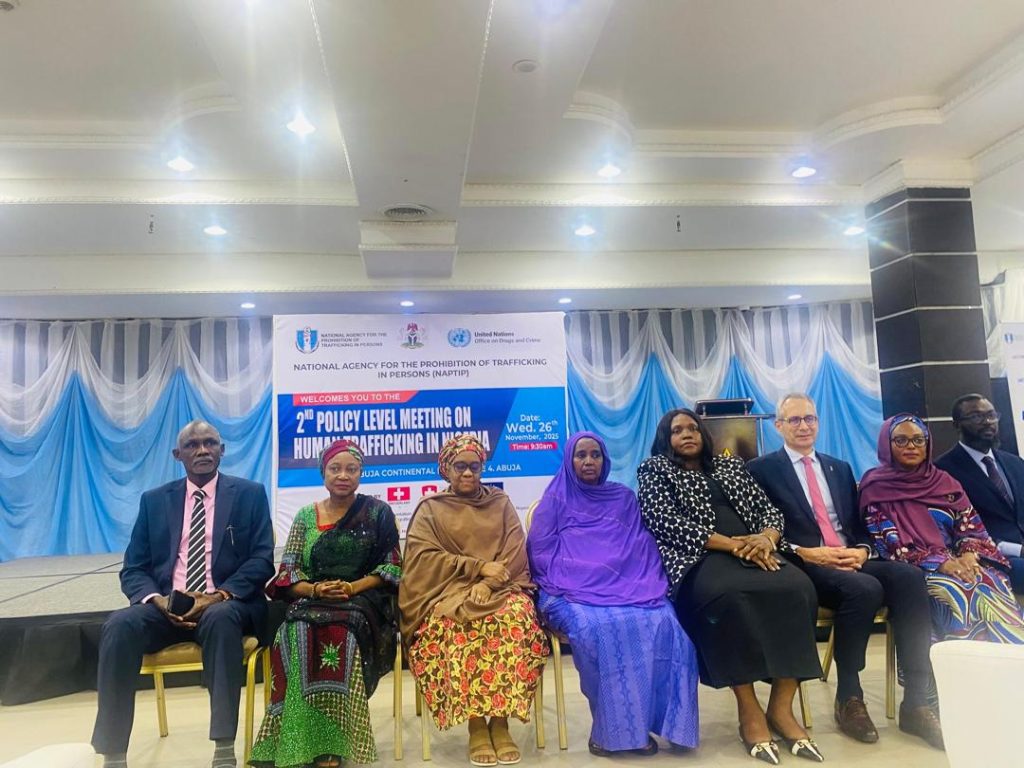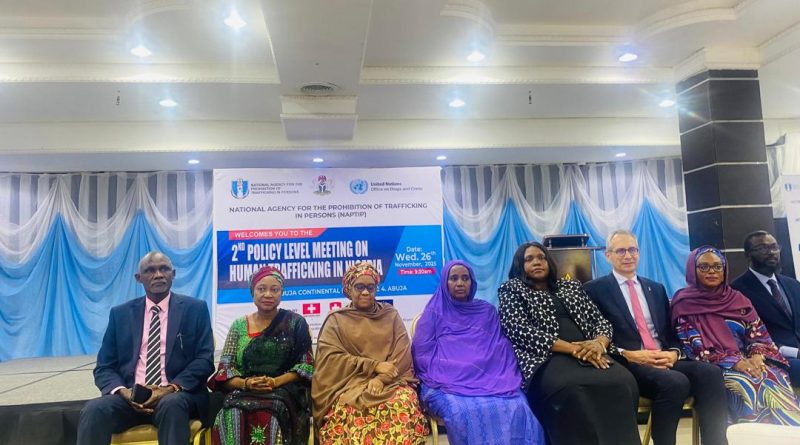NAPTIP, UNODC Renew Call For Stronger Action Against Human Trafficking
By Bukar BOLORI
The National Agency for the Prohibition of Trafficking in Persons (NAPTIP), in partnership with the United Nations Office on Drugs and Crime (UNODC) has called for intensified and coordinated efforts to combat human trafficking in the country.
The call was made on Wednesday during the second policy-level meeting on human trafficking in Nigeria, which was convened under the Swiss-funded project, From Policy to Action Implementation of the National Action Plan on Human Trafficking in Nigeria (2022–2026) that was convened to review Nigeria’s progress in combating human trafficking and assess gaps in the current National Action Plan.

It also focused on strengthening coordinated, data-driven strategies at both federal and grassroots levels, including victim protection, legal frameworks, and community-based prevention.
Representing Prince Lateef Fagbemi, the Attorney General of the Federation and Minister of Justice, the Director of Planning and Research, Victoria Ojogbana,, highlighted the urgent need for stronger national action against human trafficking.
Fagbemi emphasized that trafficking remains a pervasive crime requiring unified action at all levels of government and society.
He said: “Statistics available to us reveal that countless individuals, men, women and children, remain entrapped in modern-day slavery, exploited in forced labour, sexual sabotage and other degrading circumstances. Millions of victims of this crime remind us that the fight against trafficking is far from over and the urgent need for a coordinated and multi-sectoral response.”
He also noted that traffickers are increasingly using new technologies and methods, and therefore Nigeria must adopt dynamic, bottom-up strategies, particularly at the sub-national level.
He said: “This crime evolves with time, technology and opportunity. Hence, our approach must also evolve… our approach must be bottom-up because most of this crime happens at the sub-national level.”
Fagbemi also highlighted the launch of the National Counter-Trafficking Dashboard as a major milestone for real-time monitoring, transparency, and accountability.
He said, “A remarkable milestone recorded this year is the landmark launch of the National Counter-Trafficking Dashboard, the first of its kind in Africa. This digital platform provides real-time data on anti-trafficking activities across Nigeria, enhancing coordination, transparency and accountability. It stands as a testament to Nigeria’s leadership in data-driven governance and evidence-based policy implementation in the fight against human trafficking.”
Despite Nigeria’s progress, he expressed concern over the country’s Tier 2 ranking in the U.S. TIP Report, pointing to deficiencies in victim protection, screening, corruption, and rehabilitation services.
He said, “Despite our notable progress, it is deeply regrettable that Nigeria continues to be ranked among Tier 2 countries… the report identifies insufficient efforts at identifying and protecting victims, inadequate screening mechanisms, persistent corruption and insufficient shelter and rehabilitation services, especially for male victims.”
He further stressed that actionable recommendations for immediate implementation are necessary to address these gaps.
He said, “Key recommendations that require our immediate implementation include the investigation and prosecution of all credible allegations of official complicity in trafficking; enhanced training of frontline officers on standard procedures; robust screening and protection systems for vulnerable groups; scaling up prosecution for labour trafficking; strengthening NAPTIP’s operational capacity; activating the Victim’s Trust Fund; and increasing awareness in rural communities through sustained collaboration with civil society organizations.”
He noted the importance of planning for a new National Action Plan, as the current NAP (2022–2026) is nearing completion.
He said: “As we deliberate today, it is important to remember that the NAP 2022–2026 is approaching the end of its implementing cycle. The next phase, the development of a new NAP, must build on the lessons of the current plan. This meeting offers a timely opportunity to reflect on our successes, assess persisting gaps and begin shaping a more responsive, inclusive and result-oriented framework for the years ahead.”
Director General of NAPTIP, Hajiya Binta Adamu Bello said the meeting serves as a high-level forum for policymakers to examine progress, address remaining challenges, and agree on strategic priorities for strengthening Nigeria’s counter-trafficking response.
She said, “This meeting provides a valuable platform for high-level policy-makers of relevant sectors in the Nigerian counter-trafficking spheres to take stock of the progress we have made, to deliberate on the challenges that persist, and to chart a decisive course for the years ahead. These work plans and reports emanate from deliberations held at the National Stakeholders’ Consultative Forum on Human Trafficking.”
She revealed that NAPTIP has strengthened grassroots prevention by establishing school Vanguards, which serve as hubs for awareness, early warning, and prevention tools among young people.
She said, “In strengthening preventive mechanisms at the grassroots, NAPTIP successfully inaugurated anti-trafficking in persons and violence against persons Vanguards in schools across the country this year, bringing the total to 223 so far. These Vanguards serve as knowledge hubs and early warning networks for the prevention of trafficking and violence against young people, supported by students’ handbooks, standard operating procedures, and reporting tools.”
DG disclosed that the agency has also expanded legal hubs and grassroots partnerships, improving access to justice and community surveillance.
She said, “This brings the number of legal hubs established to five, aimed at bringing legal aid and referral services closer to victims and communities in need. In addition, NAPTIP expanded partnerships to the grassroots through ALGON to extend anti-trafficking advocacy and monitoring to all local government councils nationwide. A formal MoU with the Vigilante Group of Nigeria strengthens community surveillance and early detection of trafficking activities at the local level.”
She further explain that capacity building and structural strengthening have enhanced the frontline response, with teachers, principals, and other stakeholders trained across geopolitical zones to improve reporting and prevention in schools. Liaison offices have been upgraded to state commands, strengthening operational presence.
She said, “Under the STEP projects, about 1,000 teachers and school principals were trained to serve as peer educators and frontline actors in schools, complementing anti-trafficking content mainstreamed into the education curriculum. NAPTIP also trained stakeholders across the northeast and southwest. We have equally upgraded all NAPTIP liaison offices into full-fledged state commands, thereby improving the agency’s operational visibility and enforcement capacity across the Federation.”
She stressed that International cooperation and upgraded infrastructure have also contributed to better victim care and cross-border coordination.
She said, “Our international cooperation remains strong, as evidenced by the successful Embassy Liaison meeting, which strengthened information sharing, cross-border collaboration, and referral mechanisms for Nigerian victims abroad. The Abuja Shelter received a major facelift through the special intervention of the First Lady, and the Lagos Zonal Command Office was renovated and furnished through support from the United Kingdom, improving the environment for work and victim care.”
The DG reviewed that as the current NAP approaches expiration, NAPTIP is reviewing lessons learned to guide the development of the 2027–2031 plan while domesticating the ECOWAS TIP+ strategy for Nigeria.
She said, “The National Action Plan on Human Trafficking 2022–2026 will expire next year. Consequently, NAPTIP is ready for the development of the next National Action Plan, 2027–2031, beginning with a comprehensive review to assess what has worked and identify gaps. In this regard, NAPTIP, in collaboration with ICMPD and ECOWAS, has worked diligently to domesticate and adopt the ECOWAS TIP Plus strategy to Nigeria’s unique context, integrating existing frameworks with broader interventions addressing gender-based violence, irregular migration, and related crimes at national and sub-national levels.”
On his part, the Country Representative of UNODC, Cheikh Toure highlighted the pivotal role of local government areas in fighting trafficking and smuggling.
He said, “We remain fully dedicated to working alongside all stakeholders to strengthen institutions, both at federal level but more importantly at state level, because that’s where the action is happening. That’s where our sons and daughters are being snatched… Therefore, whatever we do, we need to look beyond Abuja, because the real challenge is in the local government areas. Improved data systems, enhanced cross-border cooperation and evidence-based policy-making have to start from the bottom up, because this data comes from local government areas before it becomes policy for Nigeria.”
He called for strong international collaboration continues to support Nigeria’s anti-trafficking efforts.
He said, “UNODC has been a key collaborator to the Federal Government of Nigeria in addressing human trafficking and migrant smuggling. From the inception of the current National Action Plan on migrant smuggling, UNODC provided extensive technical support during its initiation and development, an effort generously funded by the Government of Switzerland. Beyond the development phases, UNODC has continued to work closely with national institutions through the implementation of multiple projects supported by various partners, including the European Union.”
Toure further revealed that The annual policy-level meeting provides a critical platform for reviewing progress and setting strategic national priorities.
He noted that, “The policy meeting provides a unique annual platform for the leadership of all relevant institutions at both federal and sub-national levels to review progress in implementing the draft strategy over the past year, approve work plans for the coming year and agree on strategic priorities. Its strategic importance lies in fostering a unified, data-driven and accountable approach to addressing human trafficking and migrant smuggling supported by operational realities and a shared vision.”he said.
Ambassador of Switzerland, Patrick Egloff reaffirmed Switzerland’s support for NAPTIP and UNODC.He said, “Switzerland funds this project, which is being jointly and competently implemented by NAPTIP and UNODC… Since then, I’ve dedicated much energy on this important issue, which is a priority of Switzerland in the framework of our migration partnership with Nigeria. I will go to Benin City tomorrow… and I’m looking forward to visiting the recently inaugurated Shelter for Gender-Based Violence and Survivors of Trafficking in Uromi, Edo State.”
He stressed that strong political endorsement is essential to ensure effective implementation of the National Action Plan.
He said, “Action on the ground would be much less effective, or even impossible, without the strong political endorsement of this National Action Plan. And your presence here today… is of utmost importance. Through your presence, you underscore the unwavering commitment of the Government of Nigeria, and of all of us and our institutions here being represented, to the National Action Plan and to combating the devastating crime of human trafficking.”
He further stressed that measurable action, partnership, and victim-centered outcomes are crucial.
He said, “We are here today to review reports, assess progress of implementation of the National Action Plan, and consider work plans going forward. This task before us is paramount to ensuring effective and coordinated action. And then we can truly say we are moving from policy to action… Only through partnership can we hope to dismantle the transnational networks that profit from this exploitation labeled human trafficking, and ensure concrete actions that strengthen prevention, enhance prosecution, and provide comprehensive protection for every victim.”




